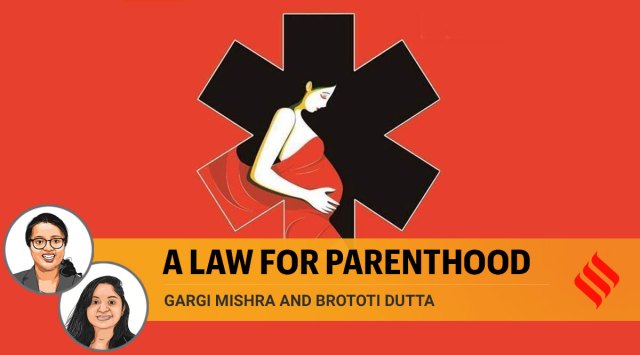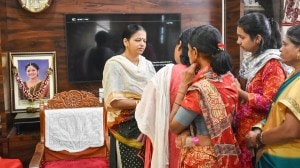- India
- International
With the Surrogacy Act, the judiciary has the chance to expand scope of reproductive rights
The Surrogacy Act and the Assisted Reproduction Technology Act miss out on addressing some crucial aspects. The SC and Delhi HC now have the opportunity to assess the Acts through the framework of reproductive rights and justice, and extend recent constitutional jurisprudence on the right to privacy, reproductive autonomy, and recognition of non-traditional families
 Petitions against the Acts have now been filed before the Supreme Court and Delhi High Court by an IVF specialist and persons desiring to become parents, respectively.
Petitions against the Acts have now been filed before the Supreme Court and Delhi High Court by an IVF specialist and persons desiring to become parents, respectively. The Surrogacy (Regulation) Act 2021 and the Assisted Reproductive Technology (Regulation) Act 2021 (ART Act) came into force early this year. The Acts aim to regulate the multimillion-dollar industry of reproductive medicine, stipulate who can access assisted reproductive technologies and procedures such as in vitro fertilisation and surrogacy, the conditions under which gamete donation and surrogacy can take place, and specify requirements for clinics to operate.
The Acts allow only married infertile couples and certain categories of women to avail of ARTs and surrogacy. Sale of gametes and any payment to the surrogate mother, other than insurance coverage and medical expenses, has been prohibited. Clinics and banks offering ART procedures have to be registered.
Reproductive technologies allow people who are unable to conceive or achieve pregnancy, for medical and non-medical reasons, to have biological children. Inequities in access to healthcare, including infertility care, are pervasive and disproportionately impact persons from marginalised contexts. Equitable access to infertility care, including reproductive technologies, is part of the full spectrum of reproductive rights, including the right to make decisions about one’s reproductive life, to health, and to equality and non-discrimination. In India, ARTs are offered by an expensive privatised medical industry that was unregulated for decades. The technologies can be used to transform traditional notions of family and strengthen the status of same-sex and other queer couples by expanding the ability to reproduce beyond heterosexual marital unions. Use of ARTs can also entrench notions of genetic parenthood as the “true” form of parenthood. ARTs provoke complex legal, ethical and social dilemmas, and their regulation requires consideration and balancing of conflicting interests and values.
Petitions against the Acts have now been filed before the Supreme Court and Delhi High Court by an IVF specialist and persons desiring to become parents, respectively. Both petitions challenge the Acts as being discriminatory and violative of reproductive autonomy and choice by denying access to ARTs to single persons and people in live-in and same-sex relationships. The petitions also oppose the ban on commercial surrogacy, arguing that it is unreasonable and deprives surrogate mothers of reproductive agency.
The petition before the SC raises valid questions about the Acts’ feasibility and workability. The availability of donor oocytes, considered fundamental for many ART procedures, is also in question since a limited number of oocytes can be retrieved and women can be oocyte donors only once. Such stipulations have been imposed to protect oocyte donors from health risks and exploitation, but they also imperil the ability of people to have children through ARTs. Shortage of oocytes due to regulatory pressures may lead to a shadow market of gametes. The ART Act also requires the oocyte donor to share their Aadhaar number, which threatens the donors’ privacy.

The question of whether commercial surrogacy should be allowed is a particularly thorny issue. Prior to 2016, guidelines and bills allowed compensated surrogacy but in 2016 a significant shift occurred when the Surrogacy (Regulation) Bill and subsequent bills prohibited commercial surrogacy. A Parliamentary Standing Committee in 2017 recommended compensated surrogacy and stated that mandating altruistic surrogacy was based on moralistic and paternalistic assumptions, and expecting free reproductive labour from women was “grossly unfair and arbitrary”. The committee relied on the testimonies of surrogates who deposed before it. The women said that they chose to engage in commercial surrogacy because other livelihood options such as domestic or garment factory work were more exploitative, and surrogacy provided them with enough remuneration to positively benefit their families. However, a Parliamentary Select Committee which examined the Surrogacy (Regulation) Bill 2019 took the stand that commercial surrogacy was unethical and antithetical to the “noble” and “selfless” instinct of motherhood. The voices of persons acting as surrogates are conspicuously absent in the report. The petitions before the courts are a valuable opportunity to re-examine the ban on commercial surrogacy. At the minimum, persons acting as surrogates should have their voices reflected in this process.
The Delhi High Court petition also raises the question of whether surrogacy should be an option for those who can biologically conceive but choose not to. One of the petitioners is a married woman without a medical indication of infertility, thus ineligible under the law, who wants to have a second child through surrogacy. She has spoken about her wish to pursue surrogacy because of the difficulties of her first pregnancy and her desire to focus on her career and health. Pregnancy and childbirth are a risky and often harrowing experience. And, in a society that offers little to no support for working women, choosing to become a mother also means taking a break from work or leaving work altogether. Surrogacy in cases as the one raised by the petition raises stark questions of privilege, exploitation and work. It makes one ask whether women should be forced to choose between their livelihood and childbearing and caregiving, and which women should bear the costs and burdens of that choice.
The Surrogacy and ART Acts have not adequately addressed or settled these and more questions. The SC and Delhi HC now have the opportunity to assess the Acts through the framework of reproductive rights and justice, and extend recent constitutional jurisprudence on the right to privacy, reproductive autonomy, and recognition of non-traditional families.
Mishra is Research and Advocacy Officer at the Center for Health Equity, Law and Policy at ILS Pune, and Dutta is the India Advocacy Adviser for Center for Reproductive Rights
EXPRESS OPINION
More Explained
Apr 26: Latest News
- 01
- 02
- 03
- 04
- 05











































